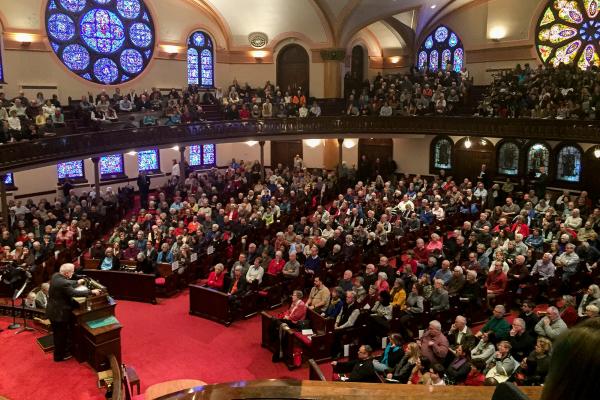TRAVELING AROUND the country this winter has given me a tremendous opportunity to promote multiracial truth-telling in many local communities as well as to foster multiracial commitments to action in service of racial justice.
During the first two weeks of the “town hall” tour around my new book, America’s Original Sin: Racism, White Privilege, and the Bridge to a New America, we engaged an audience of tremendous diversity—multiracial, intergenerational, interfaith, secular, and intersectional. The audience and panelists at these forums have been baby boomers, Gen Xers, and millennials, and again and again we’re seeing new insights and directions as a wide variety of people and perspectives are brought into the dialogue.
In Baltimore, leaders who were in the streets with their congregants following the death of Freddie Gray, such as Revs. Heber Brown III and Brad Braxton, talked about the lessons they learned from the protests and how those lessons must be applied across the country in the days to come.
In New York, Heather McGhee, president of the public policy organization Demos, said that successfully navigating our country into the new demographic reality—in a way that removes both privilege and punishment based on skin color—could be the first opportunity to truly realize our “American exceptionalism.” I often speak against the notion of American exceptionalism, but I wholeheartedly agree with McGhee’s assessment.
In Chicago, Rev. Julian DeShazier opened up one gathering with an “eyes wide open” prayer to look at who was in the room with us. His father, Robert Franklin Jr., had moderated the tour’s first town-hall meeting at Auburn Seminary in New York.
In St. Louis, Pastors Starsky Wilson and Traci Blackmon hosted a weekend justice revival with me and Rev. James Forbes. They taught us all where and how they are finding God in the parable of Ferguson.
THERE HAVE BEEN many wonderful, unplanned moments. When I arrived at MSNBC’s studios in New York to appear on Morning Joe, I was delighted to enter the green room and encounter Eddie S. Glaude Jr., a professor at Princeton University and the author of Democracy in Black: How Race Still Enslaves the American Soul. I asked Glaude, “What are you doing here?” and he responded, “To do a segment on the show with you!” I was thrilled, and we spent our prep time in the green room talking about how our two books were intertwined. On the show we had an exciting and encouraging dialogue with the hosts, resulting in Joe Scarborough saying he would have to read my book to figure out the meaning of “the idolatry of white Christianity.”
There are a number of new books available on race in America, and we authors—black and white—are looking for ways to collaborate on public conversations that will bring multiracial voices together. In one such moment, I was speaking in Baltimore, and several of the people in the audience were live-tweeting my talk. At one point, as I do in all of my talks about this book, I lifted up the leadership of the young Ferguson protesters, including Brittany Packnett, who had told me that “our movement needs more than allies, we need accomplices.” I speak every time about the tremendous importance of a new generation of young black activists, who have been pivotal in launching a national conversation about race, police violence, and our racialized criminal justice system and are building a national movement of action.
A young man in the audience named Ben Jancewicz relayed all of this to Packnett over Twitter. She was in St. Louis at the time and responded by asking Jancewicz to “please give Jim Wallis a big hug for me.” Jancewicz tweeted back what I told him: I tell her story every time I speak, and people are having powerful conversations about how they can be accomplices. Packnett responded, “I just started crying in the nail salon.”
These interactions encapsulate the power of social media networks such as Twitter to enable real-time interactions between people hundreds of miles apart. Days later, I got that hug from Packnett when I visited St. Louis.
Powerful voices of African- American, Latino, and Asian-American leaders are being lifted up, with honest response from, as Ta-Nehisi Coates so brilliantly puts it, “those Americans who believe that they are white.” With each conversation we go deeper—gaining new insights, language, and examples from which to draw.
Together we are naming the foundational racial inequality that has plagued this country since its creation as our “original sin.” Together we are exploring how repentance means more than just saying we are sorry and instead means turning around and going in a new direction, away from our ongoing injustices. And together we are proposing practical solutions to move us ever closer to the “beloved community” envisioned by Martin Luther King Jr.

Got something to say about what you're reading? We value your feedback!

